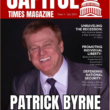No, no newspaperman actually said that. In so many words, anyway. But the following story is true.
In the spring of 2006 I met with the very bright editor of the editorial page of a major American newspaper (I do not name the paper only because I do not wish to embarrass the individual involved). After several hours of discussion, he said gently, “I know my paper has not been so fair to you.” He proceed to invite me to submit an editorial on the subject of naked short selling, suggesting a length of 1,200 words. I predicted that he would not be permitted to publish it. He replied, “I run the editorial page. I determine what gets published on it.”
Some time thereafter I sent him the editorial that appears below. The next day he called and said, “I’m terribly embarrassed to have to say this, but it appears I will not be able to publish this or anything by you.”
He sounded surprised. I wasn’t.
That said, it seems it a shame not to let it see the light of day, even at this late date. So again, the following is an editorial prepared for a major US newspaper which ostensibly is concerned with the operation of our capital market. The months referred to are 2006 months. Since then, the numbers involved have increased 30-100%.
==========================================================
A stock transaction is an exchange of stock for money. In our country the mechanisms by which stock and money change hands (”settlement”) have become divorced. Commissions are paid when money is delivered, not stock. Since follow-through incentives are weak, sometimes no stock changes hands, in which case the system creates markers of various kinds. These can be failed-to-deliver short sales (the famed “naked shorts”), the (perhaps more numerous) failed-to-deliver long sales, failures to receive from overseas exchanges, share entitlements (i.e., what is left behind in your brokerage account when your broker loans your stock to someone else), “open positions,” and “desked” trades (whereby your broker buries your order in his desk but takes your money and sends you monthly brokerage statements reflecting a trade that never actually occurred). Because our system does not adequately distinguish these markers from real shares, the markers take on lives of their own, multiplying, and creating three problems as they do.
First, these phantom shares turn proxy voting and corporate governance into a hoax. The April issue of Bloomberg magazine reports, “A robust market for stock loans puts into circulation billions of borrowed shares that can create multiple votes that corrupt corporate elections.” The effect is that, “In close contests with little room for error, the results of high-stakes company decisions may hinge on the invisible influence of millions of votes that shouldn’t be counted.” According to Thomas Montrone, CEO of Registrar & Transfer Co., “It is an abomination…. A lot of the time we have no idea who’s entitled to vote and who isn’t. It’s nothing short of criminal.” A securities consultant notes, “There are votes cast twice on almost every matter of substance… It definitely can and does, in my experience, affect the outcome of corporate elections and proposals.”
How deep is this problem? Bloomberg writes that the “Securities Transfer Association, a trade group for stock transfer agents, reviewed 341 shareholder votes in corporate contests in 2005. It found evidence of overvoting-the submission of too many ballots-in all 341 cases.” Bloomberg suggests that that this is not innocent, but that arbitrageurs have discovered and are exploiting this crack. As one source notes, “It appears to be the case where there are opportunities to game the system.” Bloomberg concludes that until these problems are fixed, “double and triple voting on one share will continue to make a mockery of shareholder democracy.”
It’s one thing if a “Should HP buy Compaq?” decision gets gamed by arbitrageurs who understand the back office better than anyone else, but there is a second way this crack is exploited to harm investors. In a normal market supply and demand balance in equilibrium. If, however, some market participants can produce phantom goods, and thus shift the supply curve to the right, they can shift the equilibrium price as well (that’s why it is “illegal”). In some companies the supply of phantom shares has become a significant fraction of (or perhaps multiple of) the shares issued and outstanding. Evidence of this comes from detailed analysis of proxy over-voting such as appears in the Bloomberg article cited above, the persistence of firms on the Reg SHO threshold list, and examination of records from transfer agents, the Depository Trust and Clearing Corporation, and Freedom of Information Act responses from the SEC. A recent SEC FOIA response regarding the 2004 FTD’s of one company reveals days where over 40% of the volume were phantom shares, but I believe it may reach more than that in some companies. While the SEC could settle this question in a heartbeat, the Commission refuses to release relevant data on the following grounds: “The fails statistics of individual firms and customers is proprietary information and may reflect firms’ trading strategies.” That those strategies are “illegal” is apparently of little moment to our regulator.
Phantom shares can be used to game proxy voting and warp market prices, but the third effect is the one that haunts me: what risk do they create for the system? Robert Shapiro, Harvard Ph.D. economist and former Undersecretary of Commerce under President Clinton, has written, “There is considerable evidence that market manipulation through the use of naked short sales has been much more common than almost anyone has suspected, and certainly more widespread than most investors believe.” His research into death-spiral converts (a type of financing that generally is accompanied by naked shorting) turned up at least 200 companies that appear to have been largely destroyed, posting “a combined market loss of more than $105 billion.” Considering the more general topic of “massive naked short sales” he writes, “we believe that this type of stock manipulation has occurred in many hundreds and perhaps thousands of cases over the last decade…. Illicit short sales on such a scale or anything approaching it point to grave inadequacies in the current regulatory regime.” It would also imply damages in the low trillions of dollars (hence, the circling by plaintiff’s attorneys that has been reported in recent months).
Again, the SEC and DTCC have sought to assuage nascent public concerns while releasing as little data as possible. The SEC’s FOIA responses, however, reveal that on any given day, 500 million shares remain unsettled (N.B. this does not include share entitlements, desked trades, open positions, overseas delivery failures, or, as far as anyone can tell, ex-clearing). SEC economist Leslie Boni analyzed the FTD problem, and her report describes FTD’s as “pervasive,” calculates that the average persistence of failures is 56 trading days, that some go on for much longer, and that these failures are not random but strategic. Bradley Abelow, a former DTCC director questioned under oath for confirmation as New Jersey Treasurer, reluctantly described settlement failures within our system as “occur[ing] as a matter of course with great regularity,” adding “fails to deliver of securities is endemic.” The SEC’s own website, in a section on Regulation SHO explaining why in January 2005 they grandfathered all failed deliveries, reads, “The grandfathering provisions of Regulation SHO were adopted because the Commission was concerned about creating volatility where there were large pre-existing open positions” (those would be the same “large pre-existing open positions” they elsewhere assure us do not exist).
A tremendous amount of quibbling occurs over whether or not such evidence is decisive. What is overlooked is that we are not debating the properties of sub-atomic particles beyond the sensitivities of modern equipment. The question of how many unsettled long and short sale, open position, desked trades, offshore failures and share entitlements exist for any firm is a knowable fact. Each element is, in fact, known by someone. They aren’t saying. Instead, those who know these elements struggle to assure the public that there is no problem, and suggest that anyone trying to bring attention to this issue is a malcontent.
We are far down a financial rabbit-hole, one in which the SEC’s Red Queen is downplaying the problem while grandfathering it on the grounds that it is “concerned about creating volatility where there were large pre-existing open positions,” and refuses to disclose the size of these “large pre-existing open positions” on the grounds that it “is proprietary information and may reflect firms’ [illegal] trading strategies.” We catch disquieting glimpses of hundreds of millions of persistent unsettled trades,








The Deep Capture website seems messed up today. Will you post an explanation please, and an ETA if possible?
Thanks
Deepcapture had a bit of a database crash this morning. Obviously we’re back online, and all recently-added content will be restored over the next few hours.
As far as an ETA…I’m getting posts re-published every few minutes right now. Save the time required to go on a date with my betrothed tonight, I’ll be working on this until it’s done.